-
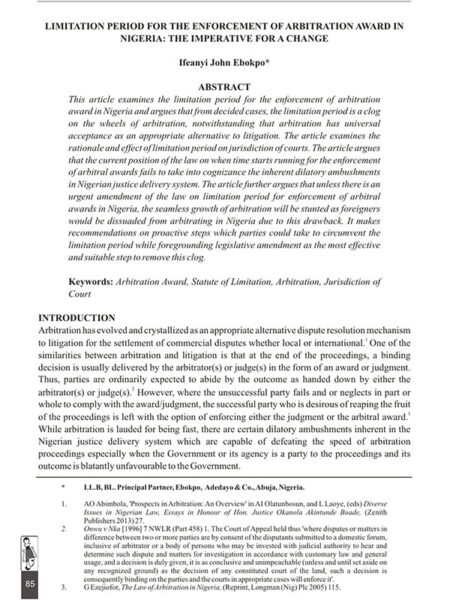
Limitation Period for the Enforcement of Arbitration Award in Nigeria: The Imperative for Change
0₦2,500.00Ifeanyi Ebokpo, Principal Partner, Ebokpo & Adedayo & Co Abuja Nigeria in his article,Limitation Period for the Enforcement of Arbitration Award in Nigeria: The Imperative for Change, examines the several modes and mechanisms for the recognition and enforcement of arbitral awards in Nigeria. He posits that the current position of the law on when time starts running for the enforcement of arbitral awards fails to take into cognizance the inherent dilatory processes in Nigerian justice delivery system. He advocates a change in the law so that the obvious drawback will not stunt the growth of arbitration.
-
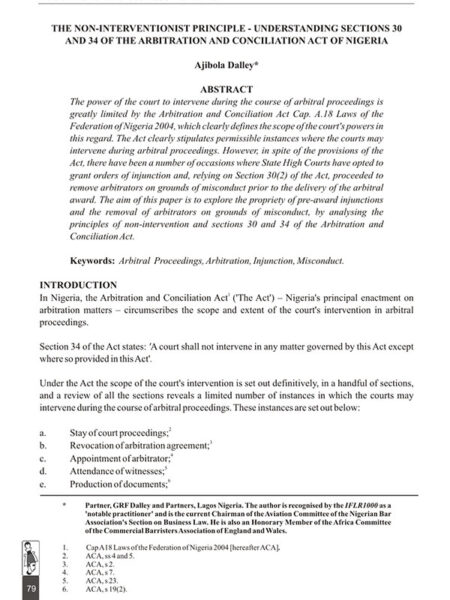
The Non-Interventionist Principle – Understanding Sections 30 and 34 of the Arbitration and Conciliation Act of Nigeria
0₦2,500.00Ajibola Dalley, Partner, GRF Dalley and Partners Lagos Nigeria in his article, The Non-Interventionist Principle – Understanding Sections 30 and 34 of the Arbitration and Conciliation Act of Nigeria, notes that though the power of the court to intervene during the course of an arbitral proceeding is limited by the Arbitration and Conciliation Act, some courts have granted orders of injunction and proceeded to remove arbitrators on grounds of misconduct prior to the delivery of the arbitral award. He explores the propriety of pre-award injunctions and the removal of arbitrators on the grounds of misconduct by analysing sections 30 and 34 of the ACA and other principles of non-intervention replete in the Act.
-
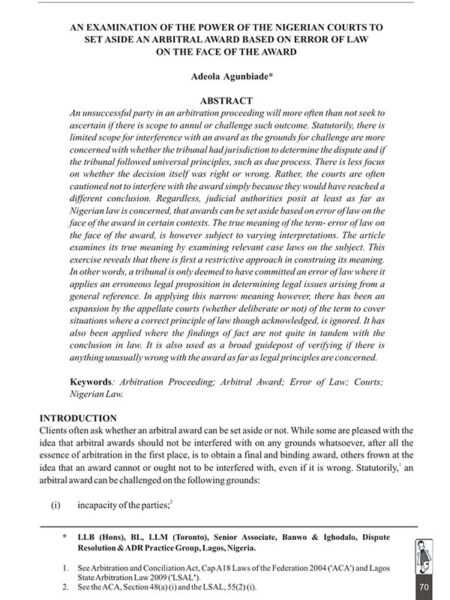
An Examination of the Power of the Nigerian Courts to Set Aside an Arbitral Award Based on Error of Law on the Face of the Award
0₦2,500.00Adeola Agunbiade, Senior Associate at Banwo & Ighodalo, Lagos Nigeria in An Examination of the Power of the Nigerian Courts to Set Aside an Arbitral Award Based on Error of Law on the Face of the Award argues that there is a limited scope for interference with an award as the grounds for challenge are usually whether the tribunal had jurisdiction to determine the dispute and if the tribunal followed universal principles, such as due process. There is less focus on whether the decision itself was right or wrong. However, courts can set aside an arbitral award based on an error of law on the face of the award. Adeola examines the true meaning of the term in the context of various judicial authorities.
-
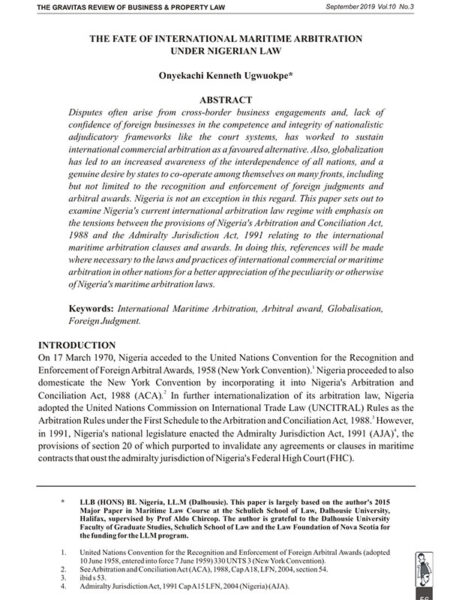
The Fate of International Maritime Arbitration under Nigerian Law
0₦2,500.00Onyekachi Ugwuokpe in his article, The Fate of International Maritime Arbitration Under Nigerian Law, dabbles into the exciting debate about the uncertainty of international maritime arbitration in Nigeria. While section 34 of the Arbitration and Conciliation Act (ACA) 1988 (modelled on the UNCITRAL Model Law on International Commercial Arbitration 1985) forbids Nigerian courts from intervening in any arbitral matter except as allowed under the Act, section 20 of the Admiralty Jurisdiction Act (AJA) 1991 invalidates any contractual provision that ousts the jurisdiction of Nigerian courts in the circumstances listed in the section. Onyekachi, in his usual inimitable style, goes to town, comprehensively reviewing judicial cases and learned commentaries and concluding that there is indeed a lacuna awaiting judicial clarity.
-
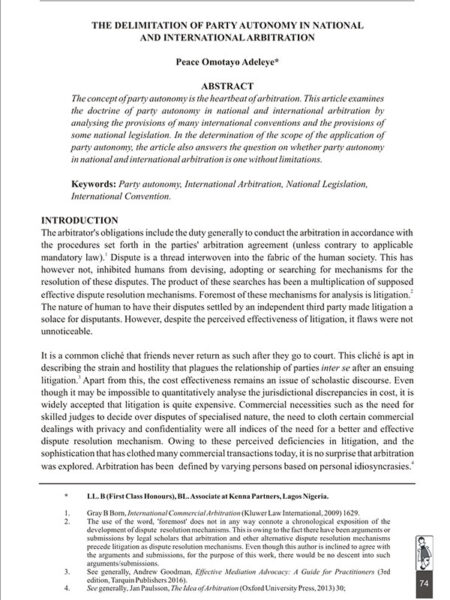
The Delimitation of Party Autonomy in National and International Arbitration
0₦2,500.00Peace Adeleye, Associate at Kenna Partners, Lagos Nigeria in her paper, The Delimitation of Party Autonomy in National and International Arbitrations, posits that the principle of party autonomy, the freedom of parties to a contract/arbitration agreement to make rules that govern them without the need for an intervention of a third party, is the soul and heart of arbitration. Adeleye comprehensively reviews national and international legislation enabling party autonomy and argues that much as parties to an arbitration agreement may want their freedom to contract to be limitless, there are indeed limits to the freedom. She discusses the limits of party autonomy in national and international arbitrations.
-
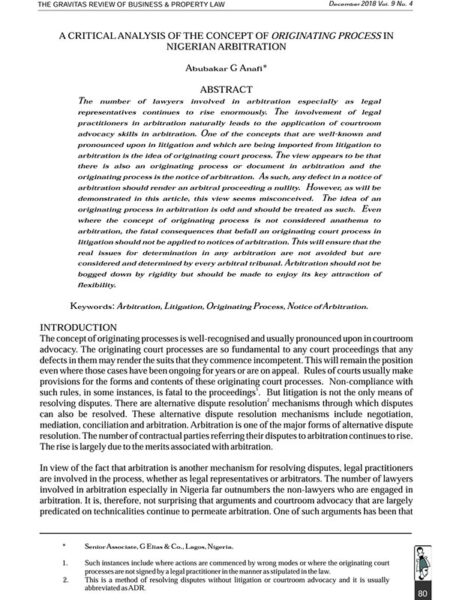
A Critical Analysis of the Concept of Originating Process in Nigerian Arbitration
0₦2,500.00Abubakar Anafi, Senior Associate, G Elias & Co in his article, A Critical Analysis of the Concept of Originating Process in Nigerian Arbitration, observes that the concept of ‘Originating Process’ which is well known in litigation with its strict parameters and devastating consequences, is already percolating the calm, simple and flexible waters of arbitration. Anafi lists 10 reasons why the concept is inapplicable in arbitration. He cautions against imitation of rigid rules of litigation which would ultimately derail the flexibility of the arbitral process.
-
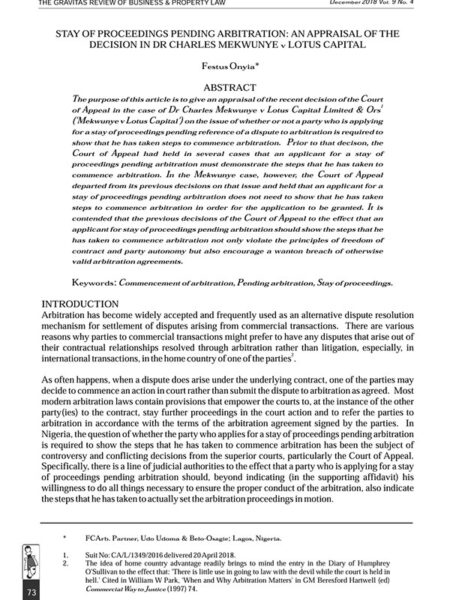
Stay of Proceedings Pending Arbitration: An Appraisal of the Decision in Dr Charles Mekwunye v Lotus Capital
0₦2,500.00Festus Onyia, Partner, Udo Udoma & Belo-Osagie in his article, Stay of Proceedings Pending Arbitration: An Appraisal of the Decision in Dr Charles Mekwunye v Lotus Capital, considers the vexed issue of whether a party who is applying for a stay of proceedings pending reference of a dispute to arbitration is required to show that he has taken steps to commence arbitration. He analyses various Nigerian cases on the issue including the recent decision of the Court of Appeal in Mekwunye v Lotus Capital and concludes that the decision aligns with the current judicial attitude towards arbitration agreements.
-
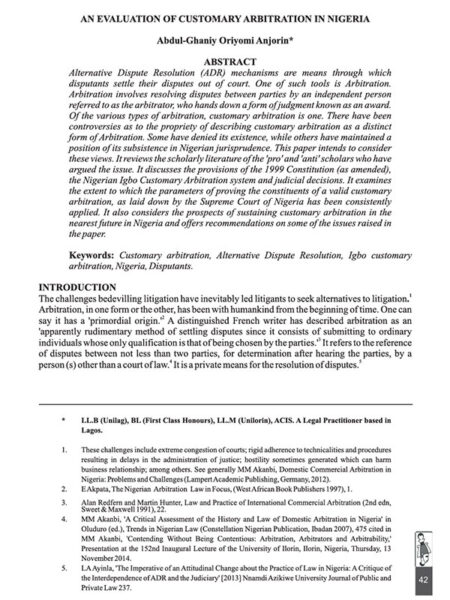
An Evaluation of Customary Arbitration in Nigeria
0₦2,500.00Abdul-Ghaniy Anjorin, in his article, An Evaluation of Customary Arbitration in Nigeria, undertakes a comprehensive overview of Customary Arbitration in Nigeria. He examines the parameters laid down by the Supreme Court in proving a compelling customary arbitration, and how these had been applied in various cases. He concludes with his view on the prospects of sustaining customary arbitration in the nearest future.
-
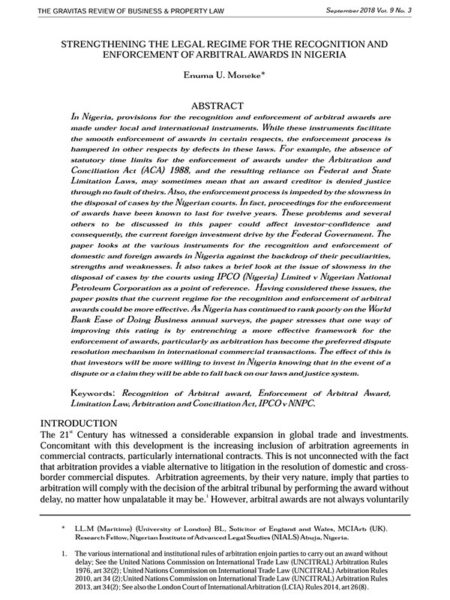
Strengthening the Legal Regime for the Recognition and Enforcement of Arbitral Awards in Nigeria
0₦2,500.00Enuma Moneke, Research Fellow, Nigerian Institute of Advanced Legal Studies, Abuja, in his article, Strengthening the Legal Regime for the Recognition and Enforcement of Arbitral Awards in Nigeria, notes that local and international instruments provide for the recognition and enforcement of arbitral awards in Nigeria. While these instruments facilitate the smooth enforcement of awards in certain respects, the enforcement process is hampered in other respects by defects in these laws. For example, the absence of statutory time limits for the enforcement of awards under the Arbitration and Conciliation Act (ACA) 1988, and the resulting reliance on Federal and States’ Limitation Laws may sometimes mean that an award creditor is denied justice through no fault of theirs. He examines the various instruments for the recognition and enforcement of domestic and foreign awards in Nigeria against the backdrop of their peculiarities, strengths and weaknesses.
-
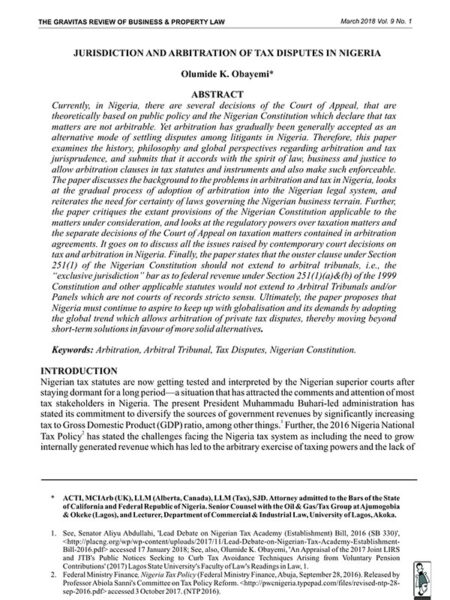
Jurisdiction and Arbitration of Tax Disputes in Nigeria
0₦2,500.00Dr. Olumide Obayemi, of the Department of Commercial & Industrial Law, University of Lagos, and of & Okeke, in his article, “Jurisdiction and Arbitration of Tax Disputes in Nigeria” observes that currently, based on public policy and the Constitution, tax matters are not arbitrable. He examines the history, philosophy and global perspectives regarding arbitration and tax jurisprudence, and submits that it accords with the spirit of law, business and justice to allow arbitration clauses in tax statutes. He reviews the decisions of the Court of Appeal on taxation matters contained in arbitration agreements, and submits that the exclusive jurisdiction conferred on the Federal High Court by Section 251(1)(a)&(b) of the 1999 Constitution should not bar arbitral tribunals which are not courts of records stricto sensu. He concludes that Nigeria must continue to aspire to keep up with and its demands by adopting the global trend which allows arbitration of private tax disputes.
-
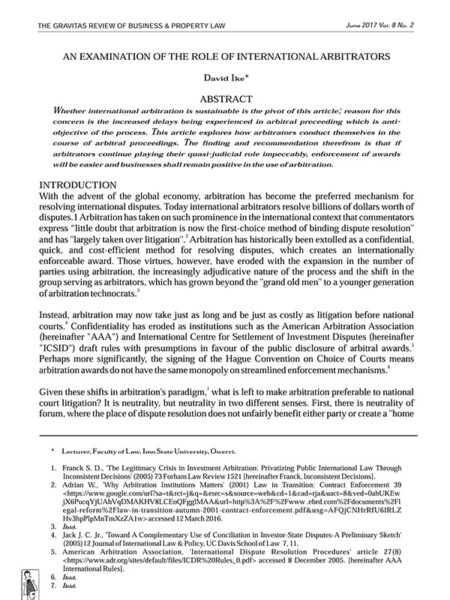
An Examination of the Role of International Arbitrators
0₦2,500.00David Ike,Faculty of Law, Imo State University, Owerri in his article “An Examination of The Role of International Arbitrators”,posits that while Arbitration has been extolled as a confidential, quick, and cost-efficient method for resolving disputes, those virtues have been eroded with the expansion in the number of parties using arbitration, the increasingly adjudicative nature of the process and the shift in the group serving as arbitrators. He considers the role international arbitrators should play in providing independent, adjudicative services to honour the parties’ expectations and contribute to the legitimacy of international arbitration. He explores the adjudicatory and administrative roles of arbitrators, opportunities to address misconduct during and after proceedings, and how market-based and institutional incentives are used to encourage appropriate conduct among arbitrators.
-
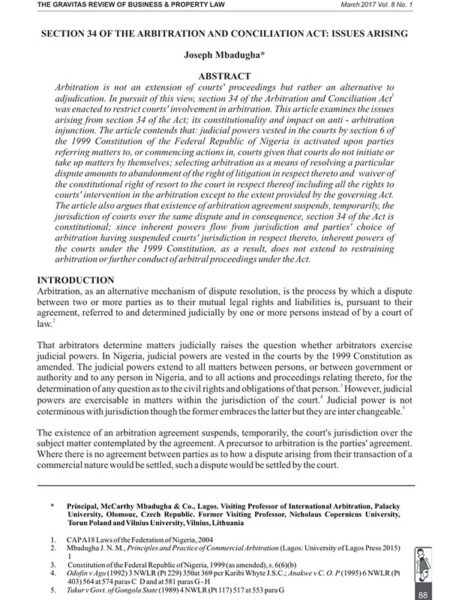
Section 34 of the Arbitration and Conciliation Act: Issues Arising
0₦2,500.00Joseph Mbadugha of McCarthy Mbadugha & Co and Visiting Professor of International Arbitration, Palacky University, Olomouc, Czech Republic in his article “Section 34 of the Arbitration and Conciliation Act: Issues Arising” examines the constitutionality of section 34 of the Arbitration and Conciliation Act. He contends that selecting arbitration as a means of resolving a particular dispute amounts to abandonment of the right of litigation and waiver of the constitutional right of resort to the court. He argues that parties’ choice of arbitration suspends the jurisdiction of courts over the same dispute and in consequence, section 34 is constitutional. He concludes that the inherent powers of the courts under the 1999 Constitution does not extend to restraining arbitration or further conduct of arbitral proceedings.
The Gravitas Review of Business & Property Law



